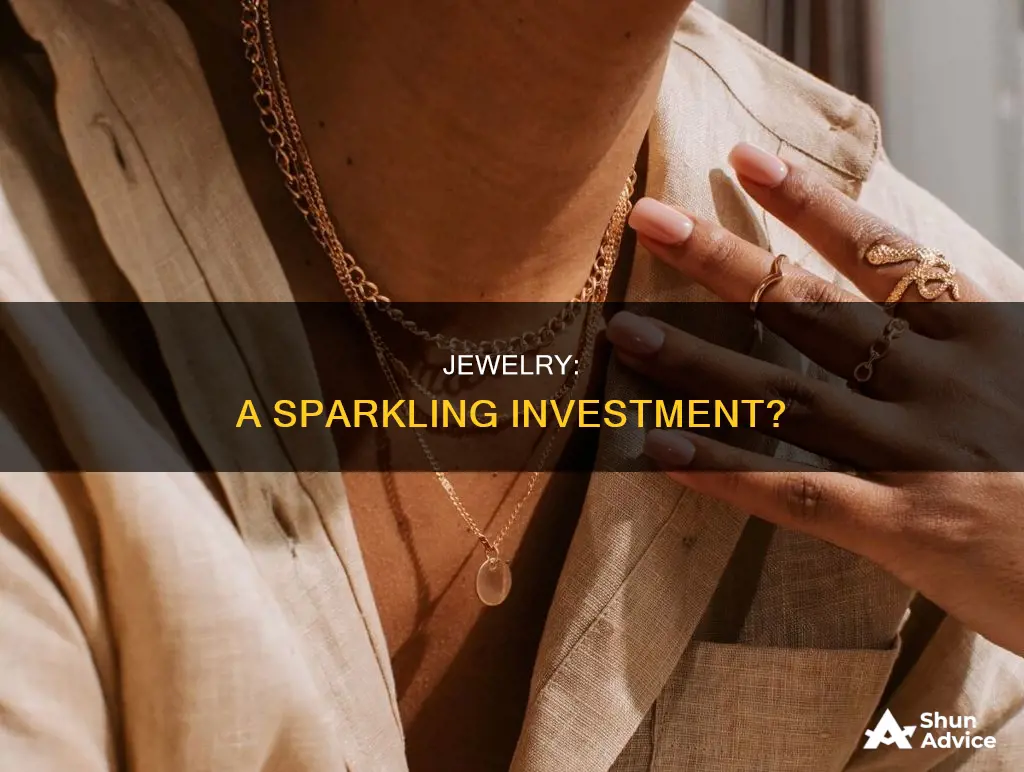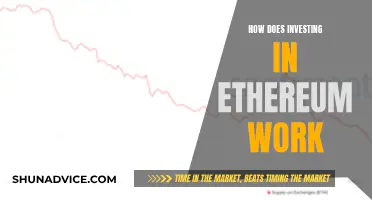
Is buying jewellery a good investment? Well, it depends. Jewellery can be a valuable asset, but there are several factors to consider. Firstly, it's important to buy second-hand and avoid paying retail prices. Classic pieces from renowned designers like Tiffany, Cartier, and Van Cleef & Arpels tend to hold their value better than trendy items. The quality of diamonds matters, with larger stones over one carat performing better on the resale market, along with classic shapes. Gold is a precious metal that tends to retain its value, especially in items made with 14 karat gold or higher. Vintage jewellery, especially designer pieces with authenticated diamonds and good settings, can be a wise investment. It's crucial to conduct thorough research, maintain emotional distance when purchasing, and be cautious of dishonest sellers.
What You'll Learn

Choose items that will hold their value
When choosing jewellery to invest in, it's important to select items that will hold their value over time. Here are some factors to consider when making your selection:
Brand and Designer
The brand name attached to a piece of jewellery can significantly impact its value. Opt for well-known luxury brands like Cartier, Van Cleef & Arpels, Tiffany & Co., and Bulgari, whose pieces tend to appreciate over time due to their high-quality materials and craftsmanship, and brand reputation. These brands are often associated with exclusivity and luxury, making their jewellery desirable to collectors.
Rarity and Scarcity
Items that are rare or limited edition tend to hold their value better. Vintage pieces, especially those with a signature or unique stamp from a renowned designer, can be highly valuable. Additionally, some brands buy back their older pieces to control their availability in the market, further increasing their value.
Quality and Materials
The quality of the jewellery and the materials used are crucial factors in determining value retention. Look for high-quality diamonds or precious gemstones, ensuring that they are authentic. Metals such as gold, platinum, palladium, and silver are good investment choices, with gold being the most stable and reliable option. When choosing gold jewellery, opt for pieces that are at least 14 to 18 karats to ensure better value retention.
Classic and Timeless Designs
Trendy and contemporary jewellery may be popular at the moment, but it may not hold its value in the long run. Instead, opt for classic and timeless designs that transcend seasonal trends. These pieces tend to have a broader appeal and are less likely to go out of style, making them more desirable to potential buyers in the future.
Condition and Maintenance
The condition of the jewellery is vital to its value. Well-maintained pieces with proper care and authentication are more likely to retain their value. Ensure that the settings are secure, and the piece is free from significant damage or extensive wear.
Remember, investing in jewellery requires patience, and it may take years for your pieces to appreciate significantly. By considering these factors and choosing wisely, you can make informed decisions when investing in jewellery to hold its value over time.
Home Sweet Home Investment: Unraveling the Intricacies of Buying a House
You may want to see also

Conduct research before investing
Conducting research before investing in jewellery is essential to making a smart purchase. Here are some key considerations to keep in mind:
Diamond Quality
Diamond quality is a crucial factor when investing in jewellery. Diamonds over one carat tend to perform better on the resale market, but other factors like cut, clarity, and colour also matter. Classic shapes tend to hold their value better than trendy designs.
Metal Type
While all precious metals are valuable, gold tends to hold its value better than others. Therefore, when investing in jewellery, look for pieces made with 14 karat gold or higher. Additionally, consider the type of jewellery, as some pieces, like necklaces, bracelets, and rings, are more valuable and have a higher resale value.
Vintage vs. Contemporary
Vintage jewellery, especially designer pieces, can make a good investment, but it's crucial to authenticate any diamonds and ensure the settings are in good condition. On the other hand, contemporary jewellery is generally not a wise investment unless it is a limited edition or a unique design from a well-known brand.
Authenticity and Documentation
Always insist on proper certification and documentation when purchasing jewellery, especially when investing significant amounts. Get a second opinion and compare prices and quality from different specialised stores. Ask about the background of the piece, the craftsperson, and how its value is calculated.
Personal Taste
Remember that you can enjoy wearing the jewellery you invest in. So, make sure to choose pieces that align with your style and taste. This way, even if the jewellery doesn't sell, you'll still appreciate owning and wearing it.
The Investment Revolution: Trends Turned on Their Head
You may want to see also

Don't take the seller's word for it
When it comes to investing in jewellery, it's crucial to remember that the seller's word should not be taken at face value. The market is flooded with replicas and knock-offs, and only an expert can accurately distinguish between genuine and fake items. Therefore, it is imperative to insist on certification and walk away if the seller is reluctant to provide it.
To avoid being duped, it is essential to conduct thorough research before investing in jewellery. While gold jewellery may seem like a safe investment, many people pay exorbitantly for items that will not retain their value. Similarly, the quality of diamonds matters, with larger stones performing better on the resale market, and classic shapes often holding their value better than trendy designs.
When considering vintage or contemporary jewellery, it is crucial to authenticate the diamonds and ensure the settings are in good condition. While designer vintage pieces can be a good investment, contemporary jewellery is generally not, unless it is a limited-edition item made with quality materials and accompanied by proper documentation.
It is also important to be cautious of your own emotions when investing in jewellery. The beauty of a piece can cloud your judgement, so it is advisable to take a step back and conduct thorough research to ensure you are not making an impulsive purchase.
In summary, when investing in jewellery, it is crucial to be vigilant, conduct thorough research, and insist on certification. By doing so, you can avoid being taken advantage of and make more informed investment decisions.
Planning for the Golden Years: Navigating UK Retirement Investment Options
You may want to see also

Try to keep emotional distance
When considering buying jewellery as an investment, it's important to try to keep an emotional distance. Jewellery is beautiful, and it's easy to get swept up in the excitement of a potential purchase. However, it's crucial to take a step back and do your due diligence before making any decisions.
- Remind yourself of the potential risks: It's important to remember that investing in jewellery is not without risk. The resale value of jewellery can depend on various factors, and there is no guarantee that you will make a profit.
- Do your research: Take the time to research the jewellery market and the specific type of jewellery you are interested in. Learn about the different markings, brands, stones, and semi-precious stones to understand their value better. This knowledge will help you make more informed decisions.
- Seek expert advice: Consult with experts in the field, such as antique and period jewellery specialists. They can provide valuable insights and help you identify wise investments.
- Authenticate before you buy: Don't rely solely on the seller's word. Insist on certification and authentication to ensure the jewellery's authenticity and avoid buying replicas or knock-offs.
- Consider the long-term value: While trendy jewellery may be popular at the moment, it may not hold its value over time. Classic pieces from renowned designers or those containing high-quality diamonds or gemstones are more likely to retain their value.
- Think beyond the financial: Jewellery can be a twofold investment, providing both present happiness and future value. If you love and enjoy wearing the jewellery, it can bring pleasure to your life, even if its financial value fluctuates.
- Diversify your investments: While jewellery can be a valuable asset, it's important to diversify your investments. Consider seeking advice from a financial advisor to explore other investment opportunities alongside jewellery.
By following these suggestions, you can strive to maintain emotional distance when investing in jewellery, making more informed and strategic decisions. Remember, investing in jewellery should be approached with careful consideration and a thorough understanding of the market to increase your chances of a successful outcome.
Public Utilities: Worth the Investment?
You may want to see also

Know where to sell your items
Knowing where to sell your jewellery is key to making a good investment. Local jewellers are likely to give you the best price because they'll see you as a potential customer. However, if you're looking to sell online, there are several options to choose from.
Online Marketplaces
If you're looking to sell your jewellery online, you can try eBay or Poshmark. These platforms allow you to set the rules and pricing, and you only have to share a small percentage of the profits as a fee. However, the downside is that you have to do everything yourself, including taking photos, writing descriptions, and handling transactions.
Resell Outlets
Resell outlets like EBTH or The RealReal are another option. However, the compensation and cut that these companies take might not always be worth it, especially if your item is under a certain value.
Online Gold Buying Companies
Online gold buying companies, such as CashforGoldUSA, can be a good option if you're looking for a high offer. These companies tend to be very competitive and work with high volumes. They also offer free and easy returns, so you can get your item back if you're not happy with their offer.
Auction Houses
Consigning with an auction house can be a great option for selling special pieces, especially if they are valued at over a certain amount. Auction houses typically have gemologists on staff who can accurately identify your jewellery and put a value on your item that reflects the current market. They also put a lot of effort into photographing, marketing, and drawing bidders to get the maximum bid possible. However, keep in mind that there is a commission involved, and the final bid is never certain, so there is some risk involved.
Antique Stores and Jewellery Consignment Shops
If you're looking to sell unique but less valuable items, venues such as Etsy, antique stores, and jewellery consignment shops might be a good option.
Retirement Investing: Understanding the True Cost of Fees
You may want to see also
Frequently asked questions
It depends. Jewellery can be a good investment if you do your research and buy wisely. It's important to choose classic pieces from top designers or those that contain high-quality diamonds or other valuable gemstones. Gold jewellery, vintage jewellery, and jewellery from well-known designers are also likely to hold their value or appreciate over time.
When investing in jewellery, it's important to consider the quality of the diamonds or gemstones, the type of metal, and whether the piece is vintage or contemporary. Diamonds over one carat tend to perform better on the resale market, and classic shapes are more likely to hold their value. Gold, particularly 14 karat gold or higher, tends to hold its value better than other metals. Vintage jewellery, especially designer pieces, can be a good investment, but it's important to authenticate any diamonds or gemstones and ensure the settings are in good condition.
To determine if a piece of jewellery is a good investment, it's essential to do your research and buy from reputable sources. Look for pieces from renowned designers or trendsetters, such as Cartier, Van Cleef & Arpels, or David Yurman. Consider the condition, provenance, and the strong names and styles in signed pieces. Additionally, seek out experts, read up on the subject, and gain as much knowledge as possible to make informed decisions.







